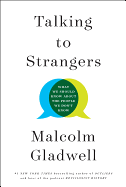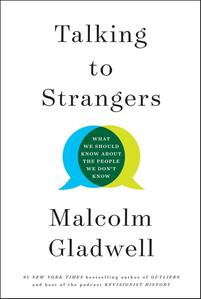
 "Prejudice and incompetence go a long way toward explaining social dysfunction in America. But what do you do with either of those diagnoses aside from vowing, in full earnestness, to try harder next time?"
"Prejudice and incompetence go a long way toward explaining social dysfunction in America. But what do you do with either of those diagnoses aside from vowing, in full earnestness, to try harder next time?"
This is the question that bestselling author and journalist Malcolm Gladwell strives to answer in Talking to Strangers. It's a slightly anticipatory title, given that Gladwell's focus isn't on the act of conversation with someone perceived as different, but on the common psychological stumbling blocks that could lead to--and indeed, have resulted in--misunderstandings and misperceptions on a grand scale. Gladwell demonstrates that having this awareness is imperative to dealing with a world that is increasingly full of encounters with people who may not share one's perspectives, beliefs or values.
As shown in his previous works The Tipping Point, Blink and Outliers, Gladwell effectively uses anecdotes to illustrate complicated concepts. This book is no exception. Most of the stories in Talking to Strangers involve familiar, high-profile cases--the death of Sandra Bland, the deception perpetrated by financier Bernie Madoff, the trial of Amanda Knox, the accusations against former Penn State University football coach Jerry Sandusky--that have made national headlines. Gladwell also delves into double agents within the CIA's ranks, the machinations of Fidel Castro, the suicide of poet Sylvia Plath and Neville Chamberlain's interactions with Adolf Hitler. Even the characters from the hit television show Friends make an appearance.
Gladwell ties all of these seemingly disparate personalities and incidents together to demonstrate that the human brain tends to "default to truth"--an instinctual, intrinsic belief that our interactions with people are genuine and honest. It's counter-intuitive to the mistaken perception that people are automatically distrusting and cynical, and the assumptions we make about each other.
"We do not behave, in other words, like sober-minded scientists, slowly gathering evidence of the truth or falsity of something before reaching a conclusion. We do the opposite. We start by believing. And we stop believing only when our doubts and misgivings rise to the point where we can no longer explain them away."
Gladwell also discusses the myth of transparency: "When we don't know someone, or can't communicate with them, or don't have the time to understand them properly, we believe we can make sense of them through their behavior and demeanor." This inevitably leads to problems, including confusing "the innocent with the guilty and the guilty with the innocent." Again, Gladwell offers fascinating real-life examples that portray how this concept has repeatedly played out in notable cases.
Like much of Gladwell's work, Talking to Strangers carries relevance for the contemporary moment. American discourse is full of anger, distrust and hostility. While people's preferred interactions are with those perceived as sharing similar viewpoints, that is an unrealistic expectation today. By enlightening readers about the inner workings of the mind when encountering someone who appears different, Gladwell offers a roadmap for more positive conversations, engagement and interaction. --Melissa Firman, writer at melissafirman.com
Shelf Talker: Malcolm Gladwell examines the dynamics behind several memorable news stories and personalities to shed light on thought patterns when communicating with strangers.

